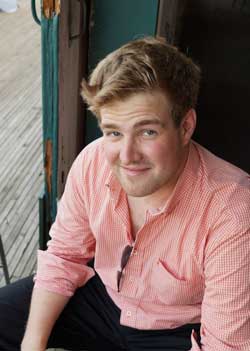Filed Under > TC Community
Continuing His Quest
Recent alum and published novelist Andrew C. Shurtleff returns to TC to continue making space for meaningful conversations
By Siddhartha Mitter
“I like to call myself a compressionist writer,” says Andrew Shurtleff, Ed.M. 2012. “I try to observe and engage as many perspectives as possible and find what underlies them all.”
The search for universal truths about the human spirit is at the heart of Shurtleff’s debut novel, Leaning on Cedars. Published by Crossroad, a press that specializes in spirituality and religion, it tells an Everyman story of an individual’s quest for identity and meaning in today’s world.
Dissatisfied and lacking a sense of purpose, the story’s hero, 21-year-old Jason Chapman, embarks on an impulsive, ill-planned trek into the Rockies. There, he is caught in a blizzard and trapped in a cave. After running out of supplies, he tries to trek out and is saved from death by a wise, mysterious stranger. As Jason heals, the two men consider what motivated their trips into the wilderness—and in the process, grapple with enduring existential questions.
This concise tale draws on some familiar archetypes and imagery. Jason’s experience is reminiscent of Plato’s famous allegory, in which people emerge from a cave to find out that what they thought was reality was merely shadows on the cave wall. The compassionate stranger echoes Jesus or Buddha.
But Shurtleff says he had “no knowledge of Platonic dialogues or the allegory of the cave” when he wrote his book. Instead, he drew inspiration from his own experiences and those he shared with friends and teachers over the years.
While an undergraduate studying cultural psychology at Clark University, Shurtleff spent a semester in Australia during which he studied with a Noongar Aboriginal elder. He learned about that community’s origins, evolution and governing ways and customs, as well as its processes of personal initiation.
On his return, he delved into Native American traditions, and learned about a ritual and meditative practice in some Native communities in which, by sitting at the foot of a cedar tree, one establishes a connection to the energy and spirit of the Earth. This practice inspired the title of Shurtleff’s book.
Shurtleff says Leaning on Cedars is in part a modern initiation tale, in which the hero’s experience in the wilderness becomes part of his passage into maturity. It echoes what brought him to graduate studies in education: A desire to help young people, particularly from under-privileged backgrounds, make their own safe passage to adulthood.
Before attending TC, Shurtleff spent a year working with urban youth in Harlem and Trenton, N.J., in a Princeton University-based program that emphasized experiential learning and trust-building. “The idea of going through the eye of the needle, and especially initiation, are things students lack healthy ways to connect to,” he says.
At TC, he found a mentor in the great scholar Maxine Greene, whose warm endorsement adorns the back cover the book. “This book echoes our collective and urgent need for clear perception,” Greene writes. “We all need cedar trees. We all need to take time to stop and reflect. I wish I had written the book myself.”
“That was incredibly humbling,” Shurtleff says of Greene’s praise. “What I learned from her is the willingness to always begin again. There is always a new beginning: embrace it, don’t fear it.”
This fall, Shurtleff begins a new chapter of his own as he returns to TC to start a doctorate in interdisciplinary studies. He plans to forge ahead as well with Edu4, an initiative he co-founded – inspired, he says, by Occupy Wall Street and by studying with Greene – to unite a coalition of diverse educators against what he calls the “multi-layered attack on public education.” He says the project aims to foster a more equitable educational landscape. He intends his doctoral research, on the relation between public space and social imagination, to support the same goal.
Whether it’s as an author, education scholar, or activist, Shurtleff says he undertakes all his projects guided by the philosophy of his mentor. “As Dr. Greene says: I don’t want to save the world,” he says. “I want to start a conversation.”
Published Friday, Aug. 31, 2012
